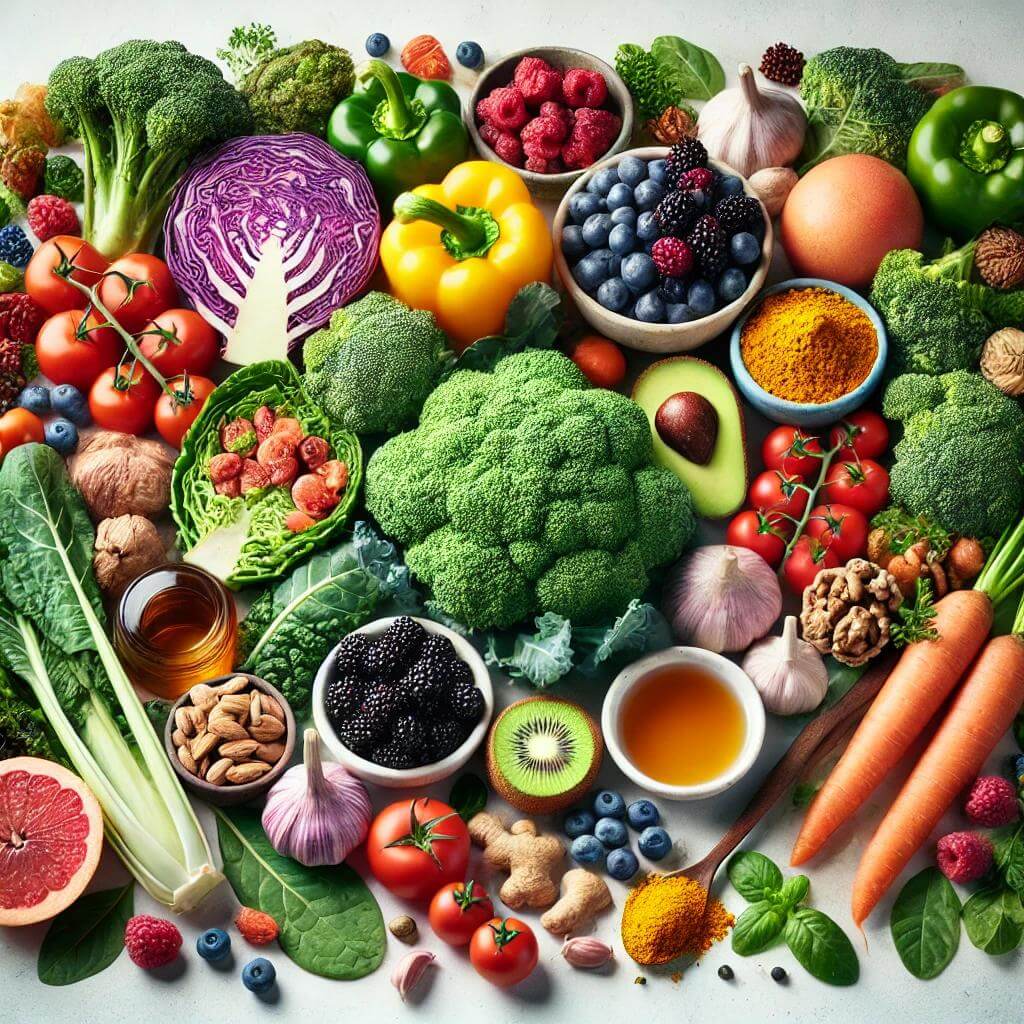Top 10 Mood-Boosting Foods: Eat Your Way to Happiness

Your mood is influenced by a complex interplay of factors, including your environment, genetics, and lifestyle. However, one of the most significant contributors to how you feel is your diet. The foods you consume have a direct impact on your brain function and, consequently, your mood. Certain foods are known to promote the production of neurotransmitters like serotonin and dopamine, which are chemicals in the brain that influence happiness and relaxation. In this article, we’ll explore the top 10 foods that can help boost your mood, arranged in descending order of effectiveness.
The Best Foods to Improve Your Mood
1. Dark Chocolate
Dark chocolate is not just a delicious treat; it’s also a powerful mood enhancer. Rich in flavonoids, dark chocolate has been shown to improve mood by boosting blood flow to the brain and reducing inflammation.
- Mood-Boosting Properties:
- Rich in Flavonoids: Flavonoids are antioxidants that help reduce inflammation and improve blood flow, which can enhance cognitive function and mood.
- Stimulates Endorphin Production: Dark chocolate stimulates the release of endorphins, the body’s natural “feel-good” chemicals.
- Increases Serotonin Levels: Dark chocolate contains serotonin precursors, which can help improve mood and reduce symptoms of depression.
- How to Incorporate:
- Enjoy a small piece of dark chocolate (70% cocoa or higher) as a daily treat.
- Add dark chocolate to smoothies, oatmeal, or yogurt for a mood-boosting snack.
2. Fatty Fish (Salmon, Mackerel, Sardines)
Fatty fish like salmon, mackerel, and sardines are high in omega-3 fatty acids, which are essential for brain health and mood regulation.
- Mood-Boosting Properties:
- High in Omega-3 Fatty Acids: Omega-3s, particularly EPA and DHA, are crucial for brain health and have been shown to reduce symptoms of depression.
- Supports Neurotransmitter Function: Omega-3s help maintain the structure of brain cells and facilitate the communication between them, supporting mood regulation.
- Rich in Vitamin D: Fatty fish are also a good source of vitamin D, which is linked to improved mood and reduced risk of depression.
- How to Incorporate:
- Include fatty fish in your diet 2-3 times a week.
- Grill or bake salmon for dinner, add mackerel to salads, or enjoy sardines on whole-grain toast.
3. Berries (Blueberries, Strawberries, Raspberries)
Berries are not only delicious but also packed with antioxidants and vitamins that support brain health and mood.
- Mood-Boosting Properties:
- High in Antioxidants: Berries are rich in antioxidants, particularly anthocyanins, which help protect the brain from oxidative stress and inflammation.
- Supports Cognitive Function: The antioxidants in berries support brain function, which can help improve mood and mental clarity.
- Low in Sugar: Berries provide natural sweetness without the sugar crash, making them a great option for maintaining stable energy levels.
- How to Incorporate:
- Add berries to your breakfast cereal, yogurt, or smoothies.
- Enjoy berries as a healthy snack or dessert.
4. Nuts and Seeds (Walnuts, Almonds, Flaxseeds)
Nuts and seeds are excellent sources of healthy fats, vitamins, and minerals that are essential for brain health and mood regulation.
- Mood-Boosting Properties:
- Rich in Omega-3 Fatty Acids: Walnuts, flaxseeds, and chia seeds are high in alpha-linolenic acid (ALA), a type of omega-3 fatty acid that supports brain health.
- High in Magnesium: Magnesium is a mineral that helps regulate the stress response and has been linked to reduced symptoms of anxiety and depression.
- Contains Tryptophan: Nuts and seeds contain tryptophan, an amino acid that the body uses to produce serotonin, the “happiness hormone.”
- How to Incorporate:
- Snack on a handful of nuts or seeds daily.
- Add them to salads, oatmeal, or yogurt for added crunch and nutrition.
5. Bananas
Bananas are a convenient and nutritious snack that provides a quick energy boost and supports mood regulation.
- Mood-Boosting Properties:
- High in Vitamin B6: Vitamin B6 is essential for the production of neurotransmitters like serotonin and dopamine, which influence mood.
- Contains Tryptophan: Bananas contain tryptophan, which the body converts into serotonin, promoting feelings of happiness and relaxation.
- Rich in Potassium: Potassium helps regulate fluid balance and nerve function, which can impact mood and stress levels.
- How to Incorporate:
- Enjoy bananas as a snack or add them to smoothies, oatmeal, or yogurt.
- Use mashed bananas as a natural sweetener in baking.
6. Leafy Greens (Spinach, Kale, Swiss Chard)
Leafy greens are packed with nutrients that are essential for brain health and mood regulation.
- Mood-Boosting Properties:
- Rich in Folate: Folate (vitamin B9) is important for brain function and has been linked to reduced symptoms of depression.
- High in Magnesium: Magnesium in leafy greens helps regulate the body’s stress response and supports relaxation.
- Contains Antioxidants: Leafy greens are high in antioxidants, which protect the brain from oxidative stress and inflammation.
- How to Incorporate:
7. Oats
Oats are a whole grain that provides a steady release of energy and supports mood stability.
- Mood-Boosting Properties:
- High in Fiber: The fiber in oats helps stabilize blood sugar levels, preventing mood swings and energy crashes.
- Rich in Complex Carbohydrates: Complex carbs in oats promote the production of serotonin, the neurotransmitter that regulates mood.
- Supports Gut Health: Oats contain prebiotic fiber that supports gut health, which is closely linked to mood regulation.
- How to Incorporate:
- Start your day with a bowl of oatmeal topped with fruits, nuts, and seeds.
- Use oats in baking or as a base for homemade granola.
8. Fermented Foods (Yogurt, Kimchi, Sauerkraut)
Fermented foods are rich in probiotics, which support gut health and, in turn, influence mood.
- Mood-Boosting Properties:
- High in Probiotics: Probiotics in fermented foods support a healthy gut microbiome, which is linked to improved mood and reduced symptoms of depression.
- Contains Tryptophan: Some fermented foods, like yogurt, contain tryptophan, which supports serotonin production.
- Supports Digestion: A healthy gut promotes better digestion and absorption of nutrients that are essential for brain health.
- How to Incorporate:
- Include fermented foods like yogurt, kimchi, or sauerkraut in your daily diet.
- Use yogurt as a base for smoothies or enjoy it with fruit and honey.
9. Turkey
Turkey is a lean protein source that is rich in tryptophan, an amino acid that supports mood regulation.
- Mood-Boosting Properties:
- High in Tryptophan: Tryptophan is a precursor to serotonin, which helps regulate mood and promote relaxation.
- Rich in Protein: Protein supports stable blood sugar levels, which can help prevent mood swings.
- Contains Vitamins B6 and B12: These vitamins are important for brain health and mood regulation.
- How to Incorporate:
- Include turkey in your meals, such as turkey sandwiches, salads, or roasted turkey for dinner.
- Use turkey as a lean protein source in soups, stews, or casseroles.
10. Green Tea
Green tea is not only a soothing beverage but also packed with compounds that support brain health and mood.
- Mood-Boosting Properties:
- High in L-Theanine: L-Theanine is an amino acid found in green tea that promotes relaxation and reduces stress without causing drowsiness.
- Rich in Antioxidants: Green tea contains antioxidants like catechins that protect the brain from oxidative stress and improve mood.
- Supports Cognitive Function: Regular consumption of green tea has been linked to improved cognitive function and reduced symptoms of depression.
- How to Incorporate:
- Drink 2-3 cups of green tea daily to support mood and relaxation.
- Use green tea as a base for smoothies or iced tea.
Summary Table of Mood-Boosting Foods
| Food Type | Key Mood-Boosting Nutrients | Additional Benefits |
|---|---|---|
| Dark Chocolate | Flavonoids, Serotonin precursors, Endorphins | Improves cognitive function, reduces inflammation |
| Fatty Fish (Salmon, Mackerel, Sardines) | Omega-3 Fatty Acids, Vitamin D | Supports neurotransmitter function, reduces symptoms of depression |
| Berries (Blueberries, Strawberries, Raspberries) | Antioxidants, Anthocyanins | Protects brain from oxidative stress, supports cognitive function |
| Nuts and Seeds (Walnuts, Almonds, Flaxseeds) | Omega-3 Fatty Acids, Magnesium, Tryptophan | Supports brain health, reduces anxiety, promotes serotonin production |
| Bananas | Vitamin B6, Tryptophan, Potassium | Promotes serotonin production, supports nerve function |
| Leafy Greens (Spinach, Kale, Swiss Chard) | Folate, Magnesium, Antioxidants | Supports brain function, reduces symptoms of depression |
| Oats | Fiber, Complex Carbohydrates, Prebiotic Fiber | Stabilizes blood sugar, promotes serotonin production, supports gut health |
| Fermented Foods (Yogurt, Kimchi, Sauerkraut) | Probiotics, Tryptophan | Supports gut health, improves digestion, promotes serotonin production |
| Turkey | Tryptophan, Protein, Vitamins B6 and B12 | Regulates mood, promotes relaxation, stabilizes blood sugar |
| Green Tea | L-Theanine, Antioxidants, Catechins | Promotes relaxation, reduces stress, supports cognitive function |
Conclusion
The foods you eat have a profound impact on your mood and overall mental well-being. Incorporating mood-boosting foods into your diet can help you maintain a positive outlook, reduce stress, and support brain health. From the flavonoid-rich dark chocolate to the omega-3-packed fatty fish, each of these foods offers unique benefits that can enhance your mood and improve your quality of life. By making these foods a regular part of your diet, you can nourish both your body and mind, leading to a happier, healthier you.
*Disclaimer: The information provided in this article is for educational and informational purposes only and should not be construed as health advice. The content is solely the personal opinion of the author and is not intended to be a substitute for professional medical advice, diagnosis, or treatment. Always seek the advice of your physician or other qualified health provider with any questions you may have regarding a medical condition or before starting any new diet or treatment. Read more



Post Comment